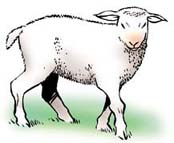Chapter IV: Conversion and reconciliation - purity of heart
- Entire (2.61 Mo)
- Part 1 (1.32 Mo)
- Part 2 (832 Ko)
- Part 3 (749 Ko)
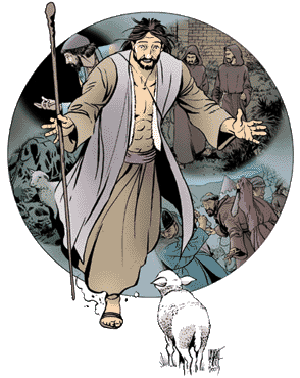 The parable of the lost sheep introduces us to what we can call divine mercy. It also shows us what virtues in particular to live by in order to remain in a state of grace. Next, new episodes in Francis' life enable us not only to know him better but also to discover what is meant by the beatitude: Blessed are the pure of heart, for they shall see God. Finally the reading and commentaries of articles 7 and 12 of our Rule will help us define and deepen what Christ calls our most precious possession, our soul.
The parable of the lost sheep introduces us to what we can call divine mercy. It also shows us what virtues in particular to live by in order to remain in a state of grace. Next, new episodes in Francis' life enable us not only to know him better but also to discover what is meant by the beatitude: Blessed are the pure of heart, for they shall see God. Finally the reading and commentaries of articles 7 and 12 of our Rule will help us define and deepen what Christ calls our most precious possession, our soul.
- 0
BEHOLD, I MYSELF WILL SEARCH FOR ME SHEEP, AND WILL SEEK THEM OUT
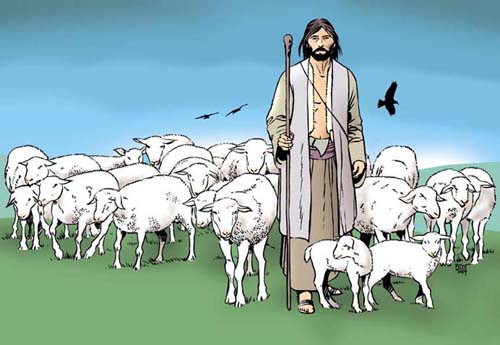
The image of the « shepherd-king » is often encountered in the Bible. * e.g. Ezekiel 34 where the title of this first part of the chapter is taken from (34 :11). In Jeremy, in chapters 2, 3 10, 23, in Zechariah 11, Psalms 23 and 80, .... Let's remember that the images used by the Lord to reveal himself to man are very often images from the daily life of the people He is addressing. We can easily see that this enables a better understanding from his listeners. Since the Hebrew people were nomadic with the herd being an integral part of everyone's life, we often find comparisons between the life of God's people and that of a herd of sheep led by a shcpherd. Jesus uses this image notably in the parable of the lost sheep from Saint Matthew (Mt. 18:12-14) and Saint Luke (Luke 15:3-7). (In their gospels, the title of the passage differs, even though it's the same parable. In the first of the evangelists, the parable is entitled « The sheep gone astray» and in the second « The lost sheep). * The two terms are used in the same passage of Ezekiel in his prophecy against the pastors of Israel : « You did not bring back the stray or seek the lost » Ez 34 :4.. This difference underlines the mercifulness of God in all possible situations. His mercy knows no limits. The sheep gone astray is the one who left the right path but which can find it again with a little effort. All it needs is a good map and compass. The lost sheep, however, is truly lost, to herself as well as to others. We could say that she is irrecuperable. However for the two kinds of sheep, whether gone astray or lost, the mission of Christ the Redeemer, Saviour of humanity, is accomplished with no holds barred. But enough said, let's instead taste this magnificent parable. * From « Centro Editoriale Valtortiano », « Isola del Liri », Italy, The Gospel as it was revealed to me, Maria Valtorta, Vol. 4, chap. 94, pp. 43 - 46 (extracts).
Parable of the lost sheep
Jesus speaks to the crowd. Gone up on the bank of a mountain stream planted with trees, He speaks to a large crowd spread out in the field where the wheat is harvested and which presents a disheartening aspect of stubble burned by the sun. It is evening. Dusk descends but already the moon rises. A beautiful and clear early summer evening. The flocks return to the fold and the ringing of bells mixes with the song of the crickets or cicadas.
Jesus uses the comparison of the flocks passing by. He says : « Your Father is like a watchful shepherd. What does a good sheherd do ? He looks for good pastures for his sheep, where there is no hemlock nor any other dangerous plant, but rather agreable clover, aromatic herbs and bitter but healthy chickory. He looks for a place where at the same time there is food, coolness, a clearly running stream, shady trees, where there is no aspic in the grass. He doesn't worry about finding richer pastures because he knows that they can easily hide snakes on the lookout and harmful herbs, but he rather prefers mountain pastures where dew renders the grass pure and fresh, but the sun clears away reptiles ; where can be found fresh air which stirs a breeze and is not heavy or unhealthy like the air of the plain. The good shepherd examines one by one his sheep. He takes care of them if they are sick, bandages them if they are hurt. For the sheep which has made itself sick from gluttony, he raises his voice. To her who would become sick in a spot which is too humid or on the contrary too hot, he tells to go to another place. If she has lost her appetite, he looks for slightly acid and aromatic herbs capable of bringing it back and offers them from the palm of his hand in a kindly voice, as if speaking to a friend.
This is how our good Father in heaven conducts Himself with his erring sons on earth. His love is the staff that gathers them in. His voice is their guide. The pastures are His Law, His home – Heaven.
Even so, a sheep leaves him. How he loved her. She was young, pure, plain-hearted, like a delicate cloud in an April sky. The shepherd looked at her with so much love knowing all the good things he could give her and all the love he could receive. And she abandons him.
A tempter comes along the road which borders the pasture. He isn't dressed austerely, but is wearing an outfit of many colors. He isn't wearing a leather belt with an axe and knife attached, but a golden belt suspended with tinkling bells, melodious like a nightingale's song, and phials of intoxicating essential oils...He doesn't have the staff with which the shepherd gathers and defends his sheep, the shepherd who, if the staff isn't sufficient, is ready to defend them with his axe or knife, even at the risk of his own life. But the tempter passing by has in his hands an incense burner glittering with precious stones from which rises smoke which is at one and the same time stench and perfume, which dazes in the same way the facets of the jewels dazzle, oh ! How false ! He continues his way singing and dropping handfuls of a shining salt on the dark path...
Ninety-nine sheep watch him, motionless.
The hundredth, the youngest and the most precious, leaps and disappears behind the tempter. The shepherd calls her, but she doesn't return. She goes, faster than the wind, to join he who has gone by ; and to sustain herself in her mad race, she eats the salt which penetrates inside and burns causing a strange delirium that drives her to find the black and green waters in the obscurity of the forest. And in the forest, following the tempter, she plunges, she penetrates, climbs and descends and she falls...one, two, three times. And one, two, three times she feel the viscous embraceof reptiles around her neck. Thirsting, she drinks the foul waters ; hungered, she takes a bite of the herbs glistening with loathsome slime.
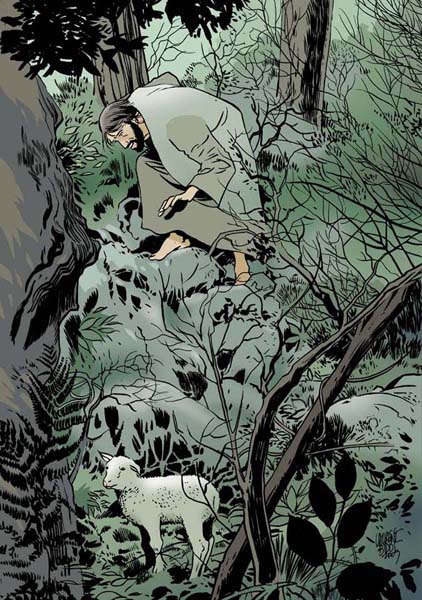
What does the good shepherd do during this time ? Since she doesn't come back to him, he goes to her. He safely encloses the ninety-nine faithful sheep and sets off. He doesn't stop until he finds the tracks of the lost sheep. He sees her from afar, how she is stupefied and entwined in reptiles, so intoxicated that she doesn't feel any longing for his familiar face of love. She mocks him. He sees her anew, sees her guilty of entering like a thief in another's dwelling, so guilty that she no longer dares look at him...Nevertheless, the shepherd doesn't tire...and he goes. He looks and looks for her, follows her, hounds her. He cries over the tracks of the strayed sheep : scraps of fleece, scraps of soul, traces of blood ; offenses of all kinds ; filth ; evidence of her lewdness. He goes and joins her.
Oh ! I have found you, beloved ! I have caught up with you ! How long the road I took for you, to bring you back home. Don't crease your dirty forehead. Your sin is buried in my heart. No one, except myself, I who love you, knows it. I will defend you against others' criticisms. I will screen you with my person, be your shield against the stones of your accusers.
Come. You are hurt ? Show me your wounds. I know them, but I want you to show them to me with the same confidence you had when you were pure, when you looked at me, your shepherd and your god, with an innocent eye. There they are. They all have a name. Oh ! How deep they are ! Who made them so deep, these wounds in the depths of your heart ? The tempter, I know it. He who has neither staff nor axe, but who injures so profoundly with his poisonous bite. And then there are
the fake jewels of the incense burner which seduced you by their luster...and the burner itself giving off a hellish sulfur, so as to burn your heart. Look ! So much damage, so much torn fleece , so much blood, so many brambles !
Oh ! Poor little deluded soul. But tell me , if I forgive you, will you love me again ? But tell me, if I open my arms to you, will you run into them ? But tell me, are you thirsty for a love that is good ? If so, come, and come back again to life. Return to holy pastures. You are crying. Your tears mixed with mine wash away all the traces of your sins. And I, to nourish you since you are exhausted by the evil which burned you, I open my chest, I open my veins and I tell you : « Eat, but live ! » Come, that I may take you into my arms. We will go more quickly into holy and safe pastures. You will forget this time of desperation. Your ninety-nine sisters, the good, will rejoice at your homecoming. I tell you, my lost sheep, that I searched for from so far away, and I found, and I saved. There is greater celebration among the good for a lost sheep who is found than for the ninety-nine righteous who didn't stray from home. »
Father or mother, priest, educator or simply a friend, isn't each one of us called to be a « good shepherd », each in his own way, each with the talents he receives ? Nevertheless, aren't we often in the role of the lost or strayed sheep ? Through the meditation of the behavior of each character in the parable, we can understand for ourselves how to follow He who is the Way, the Truth and the Life, or if such is already understood, help our neighbor to look for and follow this Way, this Truth and this Life.
The Good Shepherd
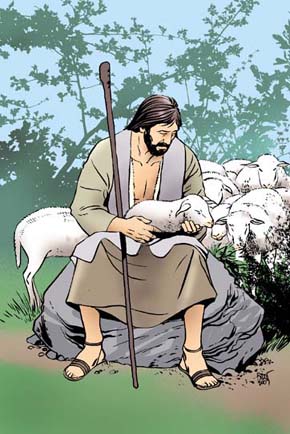 First and foremost, the shepherd is « good ». Goodness is a superior quality to wisdom because it requires love. Moreover, among the virtues of the good shepherd, the first we find is this : love. The four other virtues that the Church considers cardinal virtues4 cardinales * The cardinal virtues of prudence, justice, fortitude and temperance are like the four cardinal points of the compass which permit the sailor to find his way easily in the ocean if he knows them and makes good use of them.. Saint Augustine clarifies this subject for us, « To live well is nothing other than to love God with all one's heart, with all one's soul and with all one's efforts; from this it comes about that love is kept whole and uncorrupted (through temperance). No misfortune can disturb it (and this is fortitude). It obeys only [God] (and this is justice), and is careful in discerning things, so as not to be surprised by deceit or trickery (and this is prudence)." Saint Augustin, mor. eccl. 1, 25, 46.find in the end their source and their purpose in this theological virtue of charity.
First and foremost, the shepherd is « good ». Goodness is a superior quality to wisdom because it requires love. Moreover, among the virtues of the good shepherd, the first we find is this : love. The four other virtues that the Church considers cardinal virtues4 cardinales * The cardinal virtues of prudence, justice, fortitude and temperance are like the four cardinal points of the compass which permit the sailor to find his way easily in the ocean if he knows them and makes good use of them.. Saint Augustine clarifies this subject for us, « To live well is nothing other than to love God with all one's heart, with all one's soul and with all one's efforts; from this it comes about that love is kept whole and uncorrupted (through temperance). No misfortune can disturb it (and this is fortitude). It obeys only [God] (and this is justice), and is careful in discerning things, so as not to be surprised by deceit or trickery (and this is prudence)." Saint Augustin, mor. eccl. 1, 25, 46.find in the end their source and their purpose in this theological virtue of charity.
Love : the good shepherd loves his sheep. He doesn't just know them « a little », « wholesale » or « approximately ». No ! He knows them individually and when one is sick, he takes care of her. If one goes astray, he goes to her. The good shepherd doesn't say, « Too bad ! One is lost, ten others found. » No ! Each one is so precious in his sight that if one is lost, he immediately leaves to look for her. He follows her trail. He knows well that his sheep is unhappy and suffering. He himself suffers, from his love for her. He cries knowing how unhappy she is. But when he finds her, what joy ! What joy in spite of everything the sheep put him through : the rashness she showed in following the tempter ; the injustice she showed him by leaving he who is good and who gave her everything she needed ; the weakness in her flight after the tempter, wherein to gain strength she tasted the bitter salt of sin ; her intemperance in her attraction for the darkness. To get her back to health, the same health as the other ninety-nine sheep, he forgives her all her faults and gives himself as nourishment. Oh ! What love this shepherd shows.
Temperance * Temperance is the moral virtue that moderates the attraction of pleasures and provides balance in the use of created goods. It ensures the will's mastery over instincts and keeps desires within the limits of what is honorable. The temperate person directs the sensitive appetites toward what is good, maintains a healthy discretion and doesn't let himself be led by the desires of his heart. CCC 1809. : Our good shepherd, in the role which is his, shows towards his sheep an equilibrium in the use of the goods of creation. For their sakes, he looks for pleasant pastures where there is no hemlock nor other dangerous plants but rather lovely clover and grass, good for their health. He looks for a place where there is not only food but also coolness, a clear-running stream and trees for shade. He doesn't worry about finding richer pastures, which might seem better on the surface, because he knows that they could easily hide lurking snakes and harmful herbs. The good shepherd therefore acts first of all through prevention and sometimes also, for the good of his sheep, by the use of his authority which is his as shepherd. Such is the case when a sheep becomes ill because of overeating, wherein he doesn't hesitate to raise his voice to bring the sheep back to moderation.
Fortitude * Fortitude is the moral virtue that ensures firmness in difficulties and constancy in the pursuit of the good. It strengthens the resolve to resist temptations and to overcome obstacles in the moral life. The virtue of fortitude enables one to conquer fear, even fear of death, and to face trials and persecutions. It disposes one even to renounce and sacrifice his life in defense of a just cause. CCC 1808. : the good shepherd shows how consistently he pursues everything good. Thus when he sets off to recover the lost sheep, he doesn't stop until he finds her tracks. Since she doesn't come back to him, he goes to her. When he sees her entwined in reptiles and that she herself mocks him, he doesn't tire. He searches and searches, follows her, hounds her. Is he afraid, as were the Pharisees who shunned sinners for fear of becoming defiled by their sin, of being sullied by going to get her in the middle of the reptiles' viscous embrace ? No ! On the contrary, He doesn't hesitate to risk his life in order to save hers. “It is not the healthy who need a doctor, but the sick », (Mt 9, 12) retorts Jesus to his detractors.
Justice * Justice is the moral virtue that consists in the constant and firm will to give their due to God and neighbor. Justice toward God is called the "virtue of religion." Justice toward men disposes one to respect the rights of each and to establish in human relationships the harmony that promotes equity with regard to persons and to the common good. CCC 1807. : the good shepherd develops an elevated sense of justice. Indeed a mission is confided to him : guarding the sheep. It is true to say that he accomplishes it with the greatest diligence. Moreover, he does exactly that when looking for a place which has at the same time food and all the other elements needed for the sheep : coolness, crystal clear water, shade... Before setting off to recover the lost sheep, the good shepherd assures himself of the safety of the ninety-nine faithful. Finally when he finds the sheep, does he despise her, humiliate her in front of everyone to get revenge for her unfaithfulness ? No ! He holds her tightly against his heart and speaks to her softly. He is her defense against the criticisms of others, against the accusers' stones. Truly the lost sheep's sin doesn't stop the shepherd from losing sight of his mission of guarding his sheep against any evil, whether it comes from the tempter or from the accusers.
Prudence * Prudence is the virtue that disposes practical reason to discern our true good in every circumstance and to choose the right means of achieving it... It is not to be confused with timidity or fear, nor with duplicity or dissimulation. It is called auriga virtutum (the charioteer of the virtues); it guides the other virtues by setting rule and measure. It is prudence that immediately guides the judgment of conscience. CCC 1806. : The good shepherd is a model of patience. He doesn't put his sheep in the first pasture he comes by. No, quite the opposite. He begins by looking for good pastures which would allow them to thrive in all tranquility. When he sets off to find his lost sheep, does he leave the others to fend for themselves against all the roaming wolves in the area ? No. He encloses the ninety-nine faithful sheep in a safe place, that's to say that he gives them the means to stay in the love of their shepherd. The descriptive title, « the Apostles », summarizes well this loving prudence : « You do not abandon your flock, eternal Shepherd, but you guard it through the Apostles under your constant protection ; you still direct it through these same pastors who lead it today in the name of your Son... »
The Tempter
We showed, in chapter II, the forms of temptation that Satan uses to try to wrench our souls from God. We recall that there are three forms of temptation : the physical side of our nature through carnal attraction and gluttony, the moral side and finally the spiritual. The last one is of the most interest to Satan, the first two being above all the means of imprisoning man through the third. We find, in the parable of the lost sheep, all the arguments developped by Belial, that's to say all the tricks and multiple lies used to attain his objectives. In contrast to the shepherd's austere garb, the tempter wears many colors. In contrast to the shepherd's accessories, necessary to his work, namely a leather belt with an axe and knife attached, he has a golden belt suspended with tinkling bells, melodious like a nightingale's song, and phials of intoxicating essential oils. In contrast to the staff with which the shepherd gathers and defends his sheep, he has an incense burner glittering with precious stones. All of this seems benign, of no importance, but if we are taken in, here is what happens : he sings, the tempter, and drops handfuls of a shining salt on the dark path. Because the path, from the beginning, is dark. We can make out this strange shining salt which shows the road to follow, but we don't really know where we are walking. If, to keep up our strength, we taste the tempter's salt, which is none other than the salt of sin, the result is the opposite of what is expected.
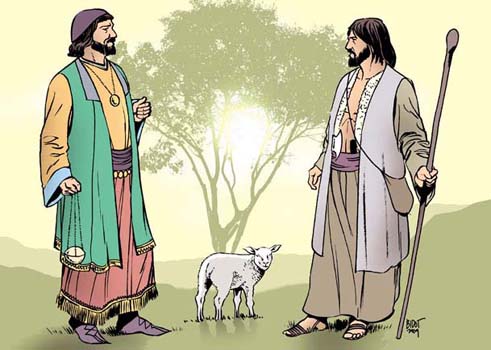
Instead of gaining strength, we lose it : we become weaker, more vulnerable, ripe pickings to fall into the second temptation. For the dark path, little by little, winds towards the blackness of the forest. Once there, no more light. We are assailed by reptiles, unable to save ourselves. The spirit is no longer master of the body but the body is master of the spirit. However, if the body proves to be a very good servant of the soul when we know how to give it good things, it is a very bad master for the spirit. If our spirit is annihilated by the body, then we become hungry and thirsty for everything
that would take away our happiness. We taste the herbs glistening with loathsome slime. What then happens ? We no longer feel the love of God who loves us. We no longer feel the love of those who love us. And even if God or our former friends try to reach us, we mock them, believing ourselves stronger, freer than them. What is the true situation ? We are like a mouse which goes into a mouse cage full of cheese and who mocks his old friends on the outside because he can gorge on all the cheese laid out by the mousetrapper. But once he has devoured all the cheese, stuffed, what is the mouse's future ? In any case, he is a prisoner, a slave to the mousetrapper, who can kill or forget him in the mouse cage. If he is forgotten, a slow death by hunger awaits. He is alone. And without a sudden jump on his part helped along by an exterior force, it is certain death.
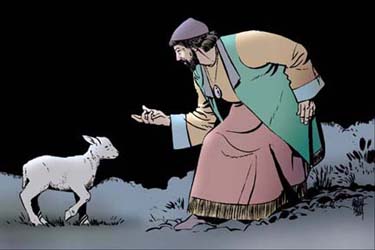
The lost sheep
The poor lost sheep exhibits non of the virtues of her good shepherd. She lacks prudence when she sees the tempter. Her reaction is not like the others, « Let's let this curious man of such attractive bearing go by, let's pay him no mind. » On the contrary, our poor sheep gives in to her desires like the little mouse which sees the cheese in the cage. She believes in what could pass for happiness, and moreover a happiness without effort. All that is demanded is to reach down to eat . Didn't she have everything she needed in her shepherd's pastures ? She had everything she needed, but the little one was greedy. She always wanted more. Not being able to find contentment in her situation, she showed intemperance. So the little sheep began by eating something apparently harmless, but which doesn't satisfy her hunger, doesn't quench her thirst. On the contrary, the act of tasting what is offered by the tempter gives her a terrible raging hunger, an unquenchable thirst. * We have in France an old proverb which sums up well this ascent of evil in the heart of a being : « he who steals an egg will steal an ox ». Instead of saying, « I need to return to the green pastures of my shepherd », which would only have been justice towards him, the little sheep sinks deeper and deeper into the blackness. She lacks force against the temptation. She sinks into the black and green waters of sin. She becomes a prisoner, a slave to her sin. So much so that when her shepherd calls her, she mocks him openly, « Go, then, you with your green pastures ! Get away from me!»
On the sheep's side, the separation is total. She is separated from God, separated from others and separated in her being. Truly, like the possessed from the lake of Gennesaret who slashed his body with stones, we find in the little sheep both the executioner and the victim. What person, indeed, unless they suffer from the disease of sadomasochism, likes hurting himself ? Our little sheep is there ; others don't hurt her, she hurts herself. The tempter can go tempt someone else. The mouse is in the mousecage.
If there was no assistance from the outside at that moment, if there was no good shepherd, it would have spelled the end for our little sheep. She would have been truly lost, lost forever. So the good shepherd joins her. But the good shepherd cannot force her, cannot extract her from her sin without her consent. He needs the sheep's consent. Needs love, needs forgiveness, which must be expressed sensibly. The good shepherd cannot do without these to help our sheep. If he forced her, the results would have been short-lived. At the first opportunity, the sheep would have left him again to plunge back into the mire. Oh ! If the sheep is startled like some souls only experience on their deathbed, then God's grace abounds, and even overflows. Let's remember the two thieves placed on the cross at the same time as Jesus. The bad thief holds onto his sin and mocks Jesus. The other, as guilty as the first, confesses his sin , asks for forgiveness and even tries to convert his companion in misfortune, « « Have you no fear of God, for you are subject to the same condemnation? And indeed, we have been condemned justly, for the sentence we received corresponds to our crimes, but this man has done nothing criminal. » Then he said, « Jesus, remember me when you come into your kingdom. » Jesus replies to him, “Amen, I say to you, today you will be with me in Paradise. » » (Lk, 23 :40-43)
The ninety-nine faithful sheep
These haven't lost their way. And for good reason. They practice the four cardinal virtues. When the tempter passes by, they look at him without moving. These sheep, just as they are, delight their shepherd. They are faithful, prudent, loving of their shepherd and show their love by listening to his voice and obeying his commandments. We might imagine that they would be entitled to judge their sinner sister. That is not the case. No more when she was lost than when she comes back to the fold. Do they lecture their sister ? No ! They refrain from it. Do they critcize her to the shepherd saying, « Our sister wallowed in pigs' mud, we no longer want her with us for fear that she defile us . » No ! On the contrary ! They rejoice at their lost sister's return, for she was lost and now is found, was dead and is now come back to life. These ninety-nine sheep are truly good and pure, for the good and pure do not criticize. Never. They understand.
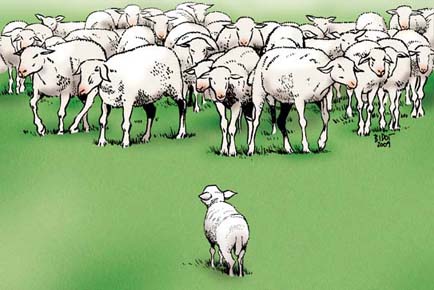
BLESSED ARE THE PURE OF HEART, FOR THEY SHALL SEE GOD
Thus is entitled Francis' sixteenth admonition * Certain manuscripts give as the title to Admonitions : « So spoke Saint Francis ». Indeed, they come from the talks Saint Francis gave in the meetings of the brothers, or chapters. He addressed to them « some opinions, orders and remonstrances. » (3 S 57). The legend of Perugia speaks of these « discussions with the brothers » and gives several examples of them (71 et ss.). We have several written testimonies which are entitled Admonitions. Some Admonitions are brief remarks in the form of commentary on the Word ; others, spiritual exhortations ; and still others, notices to make clear different aspects of the Rule, some « brief remarks necessary for the proper functioning of fraternal life » (1 C 32). We can classify the admonitions into two fairly homogenous groups : the Teachings (1 - 12) ; and the Beatitudes (13 et ss.). All of them, but especially these last ones, well deserve the definition which Father Cuthbert gives them: they constitute the « Sermon on the Mount » by Saint Francis. Franciscan Editions 1981, Saint Francis of Assisi Documents, Father Théophile Desbonnets and Father Damien Vorreux, p. 39 (introduction to the admonitions). . We are now going to show the text, very briefly, because it is going to introduce us to the discovery or deeper understanding of what we call purity of heart.
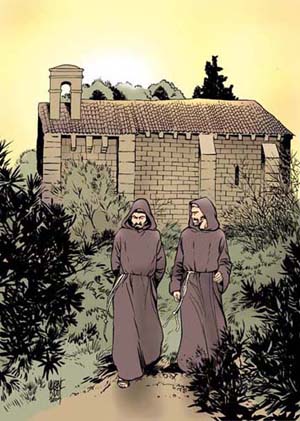 « Blessed are the clean of heart, for they shall see God. Those who truly have a clean heart despise the earth's riches, looking rather to those from heaven and, so purified of all attachment of soul and heart, never cease in adoring and looking only to the living and true Lord God. »
« Blessed are the clean of heart, for they shall see God. Those who truly have a clean heart despise the earth's riches, looking rather to those from heaven and, so purified of all attachment of soul and heart, never cease in adoring and looking only to the living and true Lord God. »
Through several anecdotes from Francis and his brothers' lives we will broach the virtue of purity. We will see two passages where Francis helps Brother Massée. We will meet him next with Sienna's inhabitants. Finally, we will see him expose the deception of a brother pretending to be a saint. This purity of heart will be found indeed in Francis himself. But Francis was always driven by a concern to help his brothers and fellow man turn their own hearts towards our Father in Heaven. And so we will see him working towards this.
These anecdotes from Francis' life are in particular going to bring in one of Francis' most endearing companions : Brother Massée. To better appreciate the following lines, let's begin by introducing the aforementioned Brother Massée : born in Marignan near Assisi, Brother Massée receives a profusion of good qualities from the Lord, physical as well as intellectual. Indeed, very tall, we have to recognize that he is a handsome man. He is honored with solid common sense. His spirit is lively and sometimes even a little acerbic. He has the gift of the gab and especially, perhaps, a simple and familiar form of eloquence when speaking about God. He touches hearts and has striking success with those who listen. He takes holy orders in 1210 or 1211. He will end up becoming very humble through contact with Francis and after having received from him some well deserved lessons... * The following narratives are inspired by the « Fioretti », chapters 10 and 11, into which are inserted other texts (the references will be given).
By the grace of God
Near Portioncule is a little wood where Brother Francis likes to withdraw for prayer. He comes back one day after having prayed at length in this wood and heads towards the community. While walking, his face glows as if enlightened by his meditation. Though his eyes look at the path so as to stay on the straight and narrow, his mind is elsewhere, still in prayer. That's the moment that Brother Francis is called by Brother Massée, who has, indeed, come to meet him. Several minutes before, unknown to Francis, Brother Massée had stopped walking to better observe him. When Brother Massée addresses Francis, his face is cheerful and his head, while talking, goes from side to side, as if to say, « I don't understand ! »! The tone of his voice has no trace of contempt or haughtiness. He is speaking to his friend in a manner that shows the total frankness between them, open to the strangest, not to say most audacious, questions. For the question he asks Francis is a bit daring : « Why you ? Why you ? Why you ? » Francis stops walking and finds Brother Massée there, a few steps in front of him. He opens his questioning eyes wide. « I don't understand your question. What do you mean by « Why you ? ». » Brother Massée's smile grows larger and opening his hands and shrugging his shoulders he clarifies : « I mean why does everyone run after you ? Why do they want to see and hear you ? And why finally do those who have heard you, me included, want to do what you say ? Physically, you are not a handsome man ! Although you know how to read, you are not well educated. And moreover, you are not from a noble family. How is it then that all these people follow you ? »
More than one, hearing this question, would be annoyed since everyone has their pride and no one likes being humbled. But for Francis, it's nothing of the sort. Francis' spirit, on the contrary, rejoices as he lifts his face towards the sky. He stays there a long time, his soul elevated towards heaven, as if waiting for God's response to the question. Brother Massée watches him, somewhat amazed by his silence. And then, slowly, Francis kneels and gives praise and glory to God. He turns to Brother Massée and says, « You want to know why me ? You want to know why me ? You want to know why everyone runs after me ? The answer to these three questions comes from the eyes of God which contemplate the good and the bad. If He had chosen a very handsome servant or a very scholarly one or even one who was from the nobility, the world could have imagined that he was being followed for any one of those reasons, and that God's goodness, His grace, had nothing to do with it. No ! God, in His goodness, chose the meanest of all His creatures. He chose me for this reason, to confound the strong and beautiful, to confound the world's science and to confound the noble and the great so that we know, listen well to this Brother Massée, that all virtue and all good come from Him and not from His creatures. He chose me to tell the world that no one can glorify themselves in His presence, but that whoever is glorified is glorified in the Lord * « ...Rather, God chose the foolish of the world to shame the wise, and God chose the weak of the world to shame the strong, and God chose the lowly and despised of the world, those who count for nothing, to reduce to nothing those who are something, so that no human being might boast before God. It is due to him that you are in Christ Jesus, who became for us wisdom from God, as well as righteousness, sanctification, and redemption, so that, as it is written, “Whoever boasts, should boast in the Lord.” » 1 Co 1 :27-31, to Whom belongs all honor and all glory in eternity. »
Hearing these words, tears well up in Brother Massée's eyes and run down his cheeks. Naturally, he didn't expect to hear such a response. Touched to the soul by such abandon in God, he kneels in turn before Francis and asks him, « Bless me, brother Francis, and pray to the Lord to give me the very holy virtue of humility. »
Francis now looks Brother Massée in the eyes and since they are so close to each other, both kneeling, he takes his hands saying, « Blessed is the servant who gives hommage to the Lord for everything. He who, to the contrary, demands a part for himself, conceals in his depths the Lord God's money, and that which he believes to possess of his own accord will be taken away. * Adm 19. Render all good to the Lord.»
On the road to Sienna
Francis often chooses Brother Massée as his traveling companion because of the charm of his words and his eminent wisdom. We find them both, some time after the previous episode, walking together on the way to Toscany. Brother Massée, walking a little in front of Francis, stops at the intersection of Poggibonsi which when coming from Assisi, allows them to go in three different directions : Florence, Sienna or Arezzo. Turning around, he asks, « Brother, which road must we take ? » Francis replies, « The road that God shows us. » At this Brother Massée bursts out laughing and says, « Ah, ah ! And how are we going to know God's will on this subject ? » Francis answers, « By the sign that I will show you, as well as by the merit of holy obedience, I order you to turn around, like children sometimes do, in this intersection, in the exact spot where your feet are at this moment. And don't stop turning until I tell you to. » Brother Massée opens his eyes wide but, by virtue of holy obedience, begins turning around in the middle of the intersection. The people going by smile, seeing this strapping man turning around like a child. Some, even, don't hesitate to cry out « Oh dear ! » when Brother Massée, overtaken by dizziness, falls to the ground. But he, bravely and humbly, gets up and continues turning as Francis hasn't said to stop. At one point when Brother Massée is turning very fast, Francis cries out, « Stop and don't move. » So he, in a last effort not to fall, stops turning. « In what direction is your head turned ? », asks Francis. Brother Massée replies, « Towards Sienna. » Francis resumes, « That is the road that God wants us to take. »
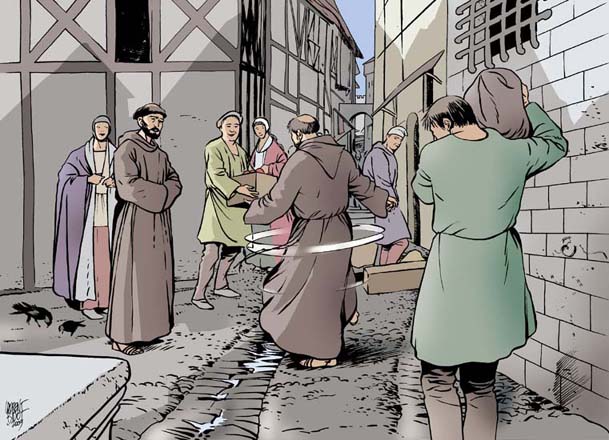
So Francis and Massée continue their walk, Massée always a little ahead and Francis behind. While walking, Brother Massée says to himself, « Francis is quite unusual all the same. Making me turn like a child in front of all those people who were going by in the intersection. » However, he doesn't dare say anything to Francis out of respect for him. But, let's be clear, he has a hard time accepting the means used to find out the divine will.
As they approach Sienna, the inhabitants come out to meet them. They had been informed by the fastest travellers that our friends and who announced this news. « The holy man from Assisi is coming with one of his companions. » The people throw themselves at the feet of the two brothers minor, all upset. « Come quickly ! Some Siennians are fighting amongst themselves because of some women, mixed with a dark story about money. There are already two dead and it risks continuing if nothing is done to bring about peace. » Francis and Massée hurry towards the heart of the melee. Shouts, insults, blows, blood running. That is the horrifying spectacle that meets their eyes upon arrival. « Stop, inhabitants of Sienna ! Stop and listen ! », shouts Francis. « Listen to this parable. »
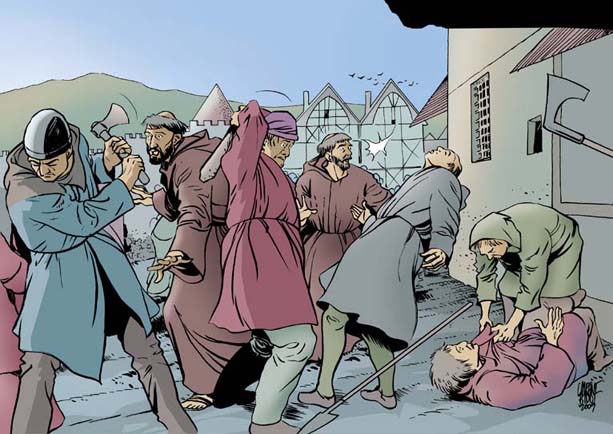
Parable about the looks given to women
A very powerful king sends two messengers successively to the queen. The first returns and contents himself with giving the response ; that is he wisely kept his eyes to himself and acts
according to the words from Ecclesiastes : « Turn your eyes away from a beautiful woman and don't be tempted by a foreigner. » (Si 9, 8) The other servant comes back in turn and after having given his message, praises the queen's beauty, « Truly, sire, I have never seen a more beautiful woman ; blessed is he who possesses her ! » But the king, « Miserable servant, you have looked at my wife with unchaste eyes. It is clear that you wanted to possess what you so attentively stared at.
The king then has the first messenger called and asks him, « What do you think of the queen ? » The messenger responds, « Much good, for she listened to me in silence and responded with wisdom. » « But isn't she beautiful ?, » inquires the king. « It is for you to contemplate her, Lord. I only convey the messages. » « You have chaste eyes, » asserts the king. « In my apartments be chaste also of body. As for the other, let him be expelled from the palace, for fear that he soil my bed. »
Francis continues, « Listen, inhabitants of Sienna ! When you are too sure of yourself, you are less careful of the enemy, and the devil, when he seizes you by a hair, is soon able to transform it into a heavy yoke. Even if he doesn't, after years of temptations, succeed in bringing down a man, the amount of time necessary matters little to him so long as he is eventually victorious. That is his only work, he has no other preoccupation, night or day. * From 2 C 113.
Do not let others be devastated by sin
And Francis continues, « But when we encounter a person, who in any case is a brother, having just committed a great sin, must we let ourselves be overtaken in turn by that sin ? Must we add a new fault to the preceeding one by judging our brother, condemning him, hitting or killing him ? No ! Truly, as great as the sin may be, even though God's servant can be touched to his soul by the offense occasioned to God, he must never lose Christ's peace nor become angry. If he did, he would attribute to himself unjustly a right that belongs only to God – judging a fault.
God's servant, who remains inaccessible to anger and trouble in his relations with others, lives a life that is in conformity with his vocation, free from all selfish attachements. Blessed is he who appropriates nothing for himself but renders unto Caesar that which is Caesar's and unto God, that which is God's. * From Adm 11. » Francis, slowly, gets his breath back and, looking with tenderness at all the faces turned towards him, adds in a tone closer to prayer than to preaching,
Love your enemies
« Love your enemies, » says the Lord.
To truly love our enemy means first of all, not to let ourselves be afflicted by the wrongs committed against us ; it is to feel painfully the sin committed by others, but only inasmuch as it is an offense against God's love ; and it is to show our brother, by our actions, that we still love him (Adm 9).
Blessed are the peacemaker
Blessed are the peacemakers, for they will be called the children of God.
Those who are truly peaceful, despite everything they suffer in this world for their love of our Lord Jesus Christ, remain in His peace in mind and body (Adm 15).
Peace be unto you, my brothers ! Peace to you ! Be « one » like the Father, Son and Holy Spirit are « One. »
The inhabitants of Sienna, touched by these words and by the fortitude with which they were pronounced, mutually forgive each other. A great bond unites them all from this moment.
Going into oneself in order to see divine works
The bishop of Sienna , learning of this intervention, invites Francis to his home and receives him and Brother Massée with pomp and circumstance deserving of lords. They dine together and the Bishop insists that the two brothers minor stay the night at the bishop's palace. Since it is very late, our two brothers accept. But very early in the morning, before the sun rises, Francis awakens Massée and tells him, « Let us go quickly before anyone awakens, for we are treated too well here. » And, unknown to everyone, the Bishop included, they noiselessly leave Sienna.
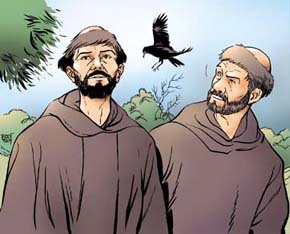 On the road back to Assisi, Brother Massée murmurs to himself, « What has this good man done ? Firstly he made me turn around like a child in front of everybody. Then, to the Bishop of Sienna who showered him with honors, he didn't say a kind word and we left without even thanking him. Frankly, it seems to me that brother Francis sometimes acts like an ignorant oaf. » And Brother Massée continued walking while pondering these sad thoughts. But then, the walking helping in his reflections and meditations, Brother Massée comes to himself and accuses himself, « How, Brother Massée, can you be so arrogant ? Francis' works of yesterday alone are holier than even those of an angel of the Lord. If Francis had not reconciled the people who were fighting amongst themselves, not only would many others than just the two have died, but many souls would have been led to hell by the devil. How stupid you can be, you who think you are so intelligent ! How arrogant you can be, you who murmur against your holy brother ! For Francis' works, accomplished yesterday manifestly come from God's will, like the good outcome which followed. »
On the road back to Assisi, Brother Massée murmurs to himself, « What has this good man done ? Firstly he made me turn around like a child in front of everybody. Then, to the Bishop of Sienna who showered him with honors, he didn't say a kind word and we left without even thanking him. Frankly, it seems to me that brother Francis sometimes acts like an ignorant oaf. » And Brother Massée continued walking while pondering these sad thoughts. But then, the walking helping in his reflections and meditations, Brother Massée comes to himself and accuses himself, « How, Brother Massée, can you be so arrogant ? Francis' works of yesterday alone are holier than even those of an angel of the Lord. If Francis had not reconciled the people who were fighting amongst themselves, not only would many others than just the two have died, but many souls would have been led to hell by the devil. How stupid you can be, you who think you are so intelligent ! How arrogant you can be, you who murmur against your holy brother ! For Francis' works, accomplished yesterday manifestly come from God's will, like the good outcome which followed. »
As for Saint Francis, he continues to walk behind in silence. But, like certain other Saints * The holy curé d’Ars (priest of Ars) , notably., Francis has a marvelous knowledge of souls * Similar features are mentioned by all his biographers, for example : LP 28, 30 ; 1 C 48-50 ; 2 C 28-31, 40 ; LM 9 8-13., which enables him to clearly hear people's private thoughts. Everything that Brother Massée says in his heart, Francis knows. So that after these last thoughts of Brother Massée, Francis approaches him, lays his hand on his shoulder, and tells him, « Brother Massée, my good Brother Massée, hold on to those thoughts that you are now thinking because they are true, good, useful and inspired by God. Forget the rest, for they were prompted by the devil. »
Another brother who was thought of as a saint
Several years after, Francis arrives in a community of minors where a brother was leading a saintly and exemplary life. He prayed night and day. He kept such a rigorous silence that even when he confessed to a brother priest, he did it through signs, without saying a word. He seemed full of piety and burning with a fervent love of God. When the brothers had a pious converstion, he showed upon hearing them a great interior and exterior joy, but always without speaking. Seeing him so, many considered him a saint.
It had already been several years that he had lived this way when Francis comes to the abbey where this brother lives. The brothers don't hesitate to share with Brother Francis the enthusiasm they feel for this brother and why they declare him saintly. But Francis interrupts the concert of praises, saying, « Enough, brothers ! Do not commend to me that which is only slyness and duplicity. If this brother does not want to confess, it means that there is only temptation and devilish guile in this way of life. Truly, this man is led and seduced by an evil spirit. » The brothers, hearing this, show their amazement and question Francis, « How can such shameless mystifications exist under such obvious perfection ? » « Let us test him, then », replies Francis, « by asking him to confess twice, or at least once, a week. If he refuses, you will see that what I have said is true. »
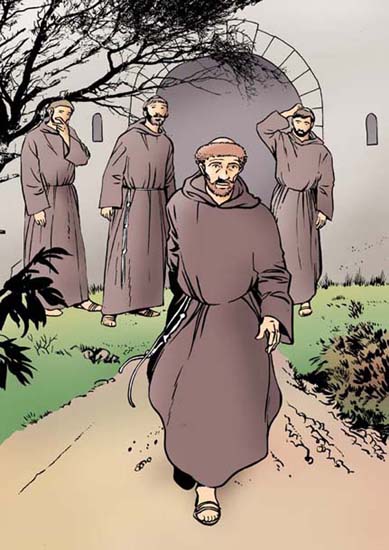 So the vicar-general, who is also present at this moment, takes the brother who was considered so saintly aside and begins to speak familiarly with him. Speak, here, is of course a figure of speech, since the brother only uses signs to communicate. Finally the vicar-general orders the brother to confess twice or at least once a week. The other refuses, places his finger on his lips and shakes his head, showing thus that he would not confess. Learning this, the brothers are stupefied by such a refusal. For the first time, indeed, the vicar of the whole Order commanded the brother in question to take part in a sacrament ! They know that confession can be not only the cause but the expression of holiness. Moreover, realizing that the brother refuses to obey the vicar-general, they remember Francis' admonition expressed during a General Chapter concerning perfect obedience and imperfect obedience, « The Lord says in the Gospel : he who does not abandon everything he possesses cannot be my disciple... » * Adm 3 (extracts)..
So the vicar-general, who is also present at this moment, takes the brother who was considered so saintly aside and begins to speak familiarly with him. Speak, here, is of course a figure of speech, since the brother only uses signs to communicate. Finally the vicar-general orders the brother to confess twice or at least once a week. The other refuses, places his finger on his lips and shakes his head, showing thus that he would not confess. Learning this, the brothers are stupefied by such a refusal. For the first time, indeed, the vicar of the whole Order commanded the brother in question to take part in a sacrament ! They know that confession can be not only the cause but the expression of holiness. Moreover, realizing that the brother refuses to obey the vicar-general, they remember Francis' admonition expressed during a General Chapter concerning perfect obedience and imperfect obedience, « The Lord says in the Gospel : he who does not abandon everything he possesses cannot be my disciple... » * Adm 3 (extracts)..
How do we abandon everything we possess ? By giving ourselves up entirely to obedience in the hands of our superior. Everything that someone does and says is an act of true obedience under two conditions : on the one hand, that it is objectively a good action, and the other, that we make sure that we do not go against the will of our superior. A person can sometimes feel that a different direction would be better and more useful for his soul than the one imposed. In that case, he must give up his project as a sacrifice to God and take on the project of his superior. That is true obedience, which is also love ; it is pleasing to God and his fellow man... Many members of a religious order, unfortunately, imagine that they know better than their superiors. They look back and return to their vomit, that's to say to their own will. Those are homicides, for their bad example sows death in many souls. » The brothers, faced with the obvious refusal of the « saint » to confess, are reduced to silence. They fear after all that their companion will not admit his scandalous deception. Dismayed, they prefer to remain silent.
However, after only several days, the brother who was thought of as a saint leaves the Order of his own accord . The saddest part is that he leaves without ever being reconciled with God and his brothers. Unusual and privileged situations always end up marred by vice. And Thomas of Celano concludes, « Let us avoid, then, any singularity which is only a seductive precipice. » (2 C 28).
The battle for purity
« Those who are truly pure of heart are those who scorn earthly goods, looking towards those of heaven, and so purified of all attachement of soul and of heart, never cease adoring, seeing nothing other than the living and true Lord God», Francis tells us (Adm 16). Scorn earthly goods so as to look to those of heaven ; easier said than done ! For in every man, because he is a being made of spirit and body, exists a certain tension, a fight between the « spirit » and the « flesh » * This struggle belongs to the inheritance of sin. Baptism effaces original sin, but even though it's totally gone, original sin has bruised our soul by making it weaker, leaving it thus more likely to lapse into sin. It's a little like a child who, very small and though his parents are in perfect physical health, contracts a fatal disease. Through a miracle, the child is saved (that's the grace of baptism). But from this fatal disease, even though completely cured, the child will continue all his life to have a weakness that he wouldn't have had if he had not had the fatal illness from which he survived (that's the legacy of original sin which demands, all lifelong, this struggle between the spirit and the flesh).. Even so, let us not fall into a total contempt of our own bodies or those of others. The « flesh » indicates its exaggerated attachement to its « me » and to the goods of the earth. But the body is worthy of respect. God as man took a human body. He has been raised from the dead, that is to say that his body is risen, and we are called to know this ressurection. Purity of heart enables us to perceive the human body, ours and our neighbor's, as a temple of the Holy Spirit, a manifestation of divine beauty.
But to use the body in a manner for which it is not destined * « My body is mine », we often hear, and « I do what I want with it. » This erroneous way of viewing one's body, which distinguishes itself by bringing it down to the level of an object, the body of me, can only bring about its downfall. It doesn't allow us to cultivate purity of heart. Let's consider then, our own bodies in light of an expression which resumes in and of itself many things : « My body is mine. » It is thus worthy of respect. risks leading our soul to its perdition when the body itself is not dragged down in the fall. Thus, a fight as is mentioned above, or a battle for purity, is to be undertaken everyday. If baptism confers to the person who receives it the grace of purification of all sins, the baptised must continue to fight against consupiscence * St. John distinguishes three kinds of covetousness or concupiscence: lust of the flesh, lust of the eyes, and pride of life.In the Catholic catechetical tradition, the ninth commandment forbids carnal concupiscence; the tenth forbids coveting another's goods. CCC 2514. All mortal sins of which penitents after a diligent self-examination are conscious must be recounted by them in confession, even if they are most secret and have been committed against the last two precepts of the Decalogue; for these sins sometimes wound the soul more grievously and are more dangerous than those which are committed openly. CCC 1456. of the flesh and disordered lust * The sensitive appetite leads us to desire pleasant things we do not have, e.g., the desire to eat when we are hungry or to warm ourselves when we are cold. These desires are good in themselves; but often they exceed the limits of reason and drive us to covet unjustly what is not ours and belongs to another or is owed to him. The tenth commandment forbids greed and the desire to amass earthly goods without limit. It forbids avarice arising from a passion for riches and their attendant power. It also forbids the desire to commit injustice by harming our neighbor in his temporal goods. CCC 2535 et 2536.. With the grace of God, he succeeds :
- by the virtue and the gift of chastity, because chastity enables to love with an upright and undivided heart ;
- by purity of intention which consists in focusing on the true goal of man : with a simple eye, the baptised seeks to find and accomplish in every work the will of God (Rm12,2 ; Col 1,10) ;
- by purity of sight, exterior and interior ; by the discipline of feelings and imagination ; by the refusal of all complacency in impure thoughts which inclines a person to turn away from the way of the divine commandments : « The sight whereof enticeth the fool to lust after it (Wisdom, 15, 5) ;
- by prayer * « I thought that continence arose from one's own powers, which I did not recognize in myself. I was foolish enough not to know...that no one can be continent unless you grant it. For you would surely have granted it if my inner groaning had reached your ears and I with firm faith had cast my cares on you ». S. Augustin, conf. 6 11,20.
CONVERSION AND RECONCILIATION – PURITY OF HEART
Article 7.
On this path of interior renewal, the sacrament of reconciliation is at one and the same time a privileged sign of the Father's mercy and a source of grace * Vatican II, decree on the ministry and life of priests 18 b..
In the first chapters of this manual, we clarified the meaning of the terms fraternity, penitence, Gospel and conversion. So let's not return to a detailed analysis of this article of our Rule. However, for article 7 as well as for article 12 (which we will study directly after), we need to deepen our knowledge of this most precious possession that the Lord gave each of us, our soul. For it is indeed our soul which is concerned by the expression, « this path of interior renewal ». Incontestably, the soul is our most precious possession ! Didn't Jesus say, « For what doth it profit a man, if he gain the whole world, and suffer the loss of his own soul? » (Mt 16, 26).
But what is the soul ?
God created man with a body and an immortal soul * It could be useful to reread the § which deals with « Life » at the end of chapter 2 ; it gives insight on the difference between existence and Life.. The soul is that immortal spirit God created in his likeness so as to be united with a body. Our soul enables us to think, love and act freely. More precisely, it permits us to know God, to love Him and to serve Him. In other words, our soul is open to the supernatural, to infinity. After our death, our soul is called to share the eternal happiness of God in Heaven. But let's not go too fast, let's consider first the present * For there are two very importan moments in the existence of each human being : the present moment and the moment of one's death. This is so true that in the writing of the second part of the prayer « Hail Mary », the Church specified : « Pray for us sinners,now and at the hour of our death. ».. On earth, the soul can be united with God by Grace, that is to say the dwelling of God in our soul. We can say that this dwelling has three phases : the first is creation ; the second is a new creation ; the third is perfection.
The first phase is common to all men, to each individual, be he Christian, member of another religion, follower of a sect, atheist or unconditional adversary of the Church of Christ : he has a spiritual, immortal soul, created by God. The second phase is a qualifying characteristic of the just who, by their will, take the soul to a creation even more complete, uniting their good actions to the goodness of God's work. They consequently have a soul already more perfect spiritually than those who stay in the first phase. The third concerns the blessed, the saints, who increase by thousands and thousands of degrees the soul that they had in the beginning, a simply human soul, and create a soul capable of resting in God * From « Centro Editoriale Valtortiano », « Isola del Liri », Italy, The Gospel as it was revealed to me, Maria Valtorta, Vol. 3, chap. 65, pp. 383-384 (extracts)..
So as to better understand this progression, let's take the symbol of the religious edifice that the entire world knows, that of Saint Peter in Rome. Its great square, firstly, decorated and robust, introduces the pilgrim into the area of the building. It is defended by two gigantic series of columns
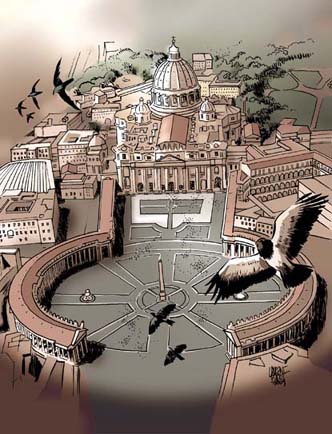
placed in the form of a circle, as if it was the defensive wall around a fort. In the same way, we need to encircle our soul, queen of the body which is the temple of the eternal Spirit, a barrier which defends it without, however, impeding the light. Even so, these two series of columns which try to join up, are open at their extremity, as if to say that this place, established to protect the building, is a merciful refuge for the most unfortunate who do not know what charity is. To get to the edifice, at the second phase, the pilgrim must climb up this square (it is indeed sloping) using imposing stairs. This climb symbolizes the liberation of the spirit from the flesh. We leave everything which is heavy at the bottom so as to climb towards what is superior : the spirit. At the top of the stairs, the pilgrim arrives under the narthex, the place of the catechumens, symbol of the effusion of love, of pity, of the desire for others to come to God. Though the square is open to the elements (the blazing sun or falling rain), this narthex is like a veil thrown over an orphan's cradle. Then, beyond the doors, the most beautiful sculptures in honor of the Creator. Numerous steps are still to be travelled in order to approach the crossing of the transepts * The representation of the Trinity given here by the artist is noteworthy : at the very top, under the cupola, God the Father. He doesn't leave the skies ; lower, in the ceiling of the dome, the Holy Spirit is represented in the form of a dove but also by the movement the artist gave to the bronze hangings of the dome : the breath of the Spirit which acts ; at the very bottom, on the altar, God who gives himself in Jesus Christ through the Holy Spirit : the Eurcharist, the body and blood of Christ. and to present our offering of virtues at the altar. It is at the altar that God makes himself present in the Holy Sacrifice of the mass and that the human soul is invited to receive communion physically and spiritually from God.
All this is very nice, you tell me. But isn't it a question , in article 7 of our Rule, of « human frailty » ? New questions arise.
How do we give space, liberty and elevation to the soul ?
To give the soul space, begin by letting go of useless things that we have in our « me ». To give it liberty, tear out the chains of false ideas. To elevate it, welcome God Love into the heart of our lives * Since it is question of three degrees, we could equally talk about : penance , patience and faithfulness or else humility, purity, justice. Or : wisdom, generosity, mercy. Or finally the luminous trilogy : faith, hope, love.. By his obedience unto death, Christ communicated to his disciples the gift of royal liberty, « so that they tear out the empire of sin in themselves by their self-denial and the holiness of their lives » * CCC 908 (LG 36).. The practice of a moral life inspired by charity gives to the Christian the spiritual liberty of God's children. He no longer comes before God as a slave, in slavish fear, nor as a mercenary in search of a salary, but as a son who responds to the love of « He who loved us first » (1 Jn 4, 19) * CCC 1828..
What is sin ?
Sin is an offense committed against God. It can take different forms enumerated in the confiteor : sin in thought, word, action or by omission. But in any case, it is about disobedience of God's commandments which are commandments of love : to love God and to love one's neighbor. Yes, even the act of sinning against our neighbor is above all a revolt against our Creator : « Against you and you alone have I sinned. What is evil in your eyes, I have done » (Ps 50:6). Sin stands against God's love for us. It turns our heart in the wrong direction, as happened to our first parents in the garden of Eden. Sin, « love of self to the point of contempt for God * S. Augustin, civ. 14 28. » sullies our souls.
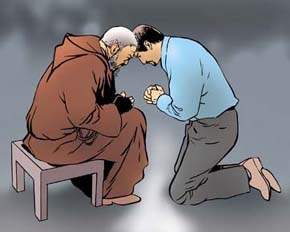 It is like, in a way, throwing out of our house the bed, the clean sheets, the dishes and the good food and replacing them with household waste and excrement. Remaining in our sin is like sleeping in our garbage every night and eating excrement everyday. The metaphor may bring a smile to your face, but as concerns our soul, that is what sin brings about. It chases God from our soul so as to replace Him by Satan. In other words, this arrogant exaltation of oneself does not in the least ressemble the thoughts and actions of Christ, as our Rule invites us to do. Jesus, by his obedience, brings about our salvation. Sin is the loss, the opposite, of our salvation. However, thanks to God the Father, Son and Holy Spirit, it is possible to restore divine life in us. This grace demands from the penitent the admission of his faults. For though « God created us without us : but he did not will to save us without us » * S. Augustin, serm. 169, 11, 13.. To receive his mercy, we must admit our faults. « If we say we have no sin, we deceive ourselves, and the truth is not in us. If we confess our sins, he is faithful and just, to forgive us our sins, and to cleanse us from all iniquity. »(1 Jn 1 : 8-9) * CCC 1847.
It is like, in a way, throwing out of our house the bed, the clean sheets, the dishes and the good food and replacing them with household waste and excrement. Remaining in our sin is like sleeping in our garbage every night and eating excrement everyday. The metaphor may bring a smile to your face, but as concerns our soul, that is what sin brings about. It chases God from our soul so as to replace Him by Satan. In other words, this arrogant exaltation of oneself does not in the least ressemble the thoughts and actions of Christ, as our Rule invites us to do. Jesus, by his obedience, brings about our salvation. Sin is the loss, the opposite, of our salvation. However, thanks to God the Father, Son and Holy Spirit, it is possible to restore divine life in us. This grace demands from the penitent the admission of his faults. For though « God created us without us : but he did not will to save us without us » * S. Augustin, serm. 169, 11, 13.. To receive his mercy, we must admit our faults. « If we say we have no sin, we deceive ourselves, and the truth is not in us. If we confess our sins, he is faithful and just, to forgive us our sins, and to cleanse us from all iniquity. »(1 Jn 1 : 8-9) * CCC 1847.
Divine Mercy in the Old Testament
In the Old Testament, the concept of mercy has a long and rich history * From this paragraph and for the two following ones, the main content is composed of modified extracts from the second encyclical letter of our sovereign pontiff John-Paul II Dives in misericordia (divine mercy) (Pierre TEQUI Editor 1980). . We must go back to its beginning so that the mercy that Christ revealed can shine in its full splendor. We have lost count of the number of times that God has shown mercy to man, whether individually or communally. There is no lack of men and prophets in Israel who have awakened this awareness of a merciful God * Jgs 3:7-9 ; 1 Kg 8:22-53 ; Mi 7:18-20 ; Is:1:18, 51:4-16 ; Ba 2:11, 3:8 ; Ne:9.. At the origin of this conviction is situated the fundamental ordeal the chosen people experienced in the Exodus : the Lord sees the misery of his people reduced to slavery, He hears their clamor, perceives their anguish and decides to deliver them (Ex 3:7-8). In this act of salvation accomplished by our Lord, the prophet discerns His love and compassion (Is 63:9). It is there that takes root in the whole people and in each of its members trust in divine mercy, mercy that one can invoke in all tragic circumstances.
To this we must add that man's misery is also his sin. The people of the Old Alliance know this misery at the time of the Exodus, when they erect a golden calf. From this act of breaking the alliance, the Lord Himself triumphs by solemnly declaring to Moses : O the Lord, the Lord God, merciful and gracious, patient and of much compassion, and true » (Ex 34:6). It is in this central revelation that the chosen people, each and every one of them, find, after every fault, strength and reason to turn towards the Lord to remind Him precisely of what He revealed about Himself and to implore his forgiveness * Nb 14 :18 ; 2 Ch 30 :9 ; Ne 9 :17 ; Ps 86 (85) :15 ; Ws 15 :1 ; Sir 2 :11 ; Jl 2 :13.. Thus the Old Testament encourages the unfortunate, especially those who are heavy with sin, to call on His mercy. In a certain sense, divine mercy is opposed to divine justice. Indeed, in many cases, divine mercy is not only more powerful but even more fundamental than justice : love, greater than justice or even more, justice in the service of charity.
It is significant that the prophets, in their preaching, link mercy, which they often talk about because of the people's sins, to the image of ardent love that God brings to them. In this preaching, mercy means a particular powerfulness of love, which is stronger than the chosen people's sin and unfaithfulness. And indeed, if He finds himself face to face with penitence, an authentic conversion, God again reestablishes His people in His grace (Jr 31:20, Ez 39:25-29).
Divine Mercy in the Easter Mystery
When Jesus exercises his mission, we see Him accomplish the words of the prophet Isaiah which were read to the inhabitants of Nazareth, « The Spirit of the Lord is upon me. Wherefore he hath anointed me to preach the gospel to the poor, he hath sent me to heal the contrite of heart, to preach deliverance to the captives, and give sight to the blind, to set at liberty them that are bruised, to preach the acceptable year of the Lord, and the day of reward » (Lk 4 : 18-19). It is highly significant that these men are above all the poor who do not have a livelihood, those who are deprived of freedom, the blind who cannot see the beauty of creation, those who live in affliction of heart or who suffer because of social injustice, and finally, the sinners. It is especially to these men that the Messiah becomes a particularly visible sign of the fact that God is love ; He becomes a sign of the Father. Christ embodies and personifies mercy. For those who see it and find it in Him, God becomes visible like the Father rich in mercy. « He that seeth me seeth the Father also » (Jn 14:9).
It is incontestably in the Easter mystery, Christ's passion and resurrection, that the Father's merciful love is the most clearly made manifest. Indeed, the Cross "is the most profound condescension of God to man [...] » (Dives in misericordia, 8) and to what man, especially in the most difficult and painful moments, calls his unfortunate fate * A fairly common picture can help us better understand the meaning and the effect of the sacrifice of the cross : that of an injured bird. Mankind, since the original fall, are like birds enclosed in an immense aviary. This aviary, even though immense, remains perfectly impregnable because of the wire netting, thus preventing the birds from rising into the sky, where there is space and liberty. Nevertheless, one bird is going to enable all of the others to regain their lost liberty. This bird, for love of all the rest, is going to rise to the summit of the aviary with force and determination, throw itself against the impregnable wire netting and so make a breach in it. But to do this, the bird gives the gift of his life. The shock of him hitting the wire netting is so brutal that his sacrifice brings about his own death. Yes, the top of his head, his wings, his legs, all his feathers covered in blood give witness to the intensity of the shock and thereby to the immeasurable love which he holds for the totality of the pisoner birds. He is there, inert, the breath of life having left him. No one moves in the aviary. Everyone is looking at the mortal remains without perceiving for all that the liberty before them, so close, only a few flaps of the wings away. Another event, as extraordinary as the first, takes place three days later : the resurrection of the sacrificed bird. God in his infinite mercy, gives the breath of life back to this bird. What joy at that moment in the aviary ! What jubilation ! And they all discover then that the cage is open ; they can all now fly away..
« The Cross is like a touch of eternal love upon the most painful wounds of man’s earthly existence. » (Dives in misericordia, 8) It is equally the completion of the messianic program that Christ formulated in the Nazarene synagogue and then repeated in front of John the Baptist's messengers (Lk 7 : 20-23). The fact that Christ is risen on the third day is the sign that marks the accomplishment of the messianic mission, sign which is the crowning of the complete revelation of merciful love in a world subdued by evil. It constitutes at the same time the sign which announces « a new heaven and a new earth » (Rv 21:1), when God « shall wipe away all tears from their eyes: and death shall be no more, nor mourning, nor crying, nor sorrow shall be any more, for the former things are passed away » (Rv 21:4).
Reconcilation, privileged sign of the Father's mercifulness
In the Gospel according to Saint Luke, we find a series of three parables making up his fifteenth chapter and entitled, « The three parables of mercifulness » including « the lost sheep », « the finding of the groat » and finally « the prodigal son ». This last (Lk 15:11-32) permits us to recognize not only the Father's mercy towards us but equally the real effects of this reconciliation with God.
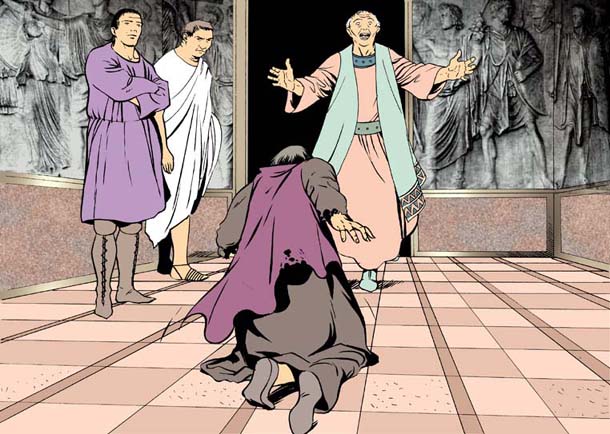
The son receives his part of the inheritance from his father, leaves home and spends everything living a dissolute life in a faraway country. This son represents man of all times, beginning by he who lost his inheritance of grace and justice originally. But this parable is extremely far-reaching. It indirectly touches each break of love's alliance, each loss of grace, each sin. In brief, it concerns me. The son, « after he had spent all,... he began to be in want », especially since there was a great famine in that country where he went after leaving his father's house. « And he would fain have filled his belly with the husks the swine did eat »; the pigs he was feeding for « one of the citizens of that country ». But even that was refused him, for in that region the health of the pigs was more important than the health of the person taking care of the pigs. We see, thus, in this passage that the analogy moves little by little towards the interior of man. The inheritance received from his father consisted of material goods, but more important than these goods, was the dignity of the son in his father's house.
The material situation in which he finds himself should have made him conscious of the loss of that dignity. He did not think of it beforehand, when he had asked of his father his part of the inheritance so as to go far away. And it seems that he is still not aware of it at the moment when he says to himself, "How many hired servants in my father' s house abound with bread, and I here perish with hunger?" He measures himself by the measure of the things he has lost, that he no longer "owns", while the workers in his father's house, they "possess" them. These words express above all his attitdue towards material goods. Nevertheless, between the lines is hidden the tragedy of his lost dignity, the awareness of the wasted character of his filial kinship. And so he makes a decision, "I will arise, and will go to my father, and say to him: Father, I have sinned against heaven, and before thee: I am not worthy to be called thy son: make me as one of thy hired servants" (Lk 15: 18-19). Words which reveal more profoundly the essential problem. In the difficult material situation where the prodigal son found himself because of his thoughtlessness, because of his sin, a sense of his lost dignity also developed. When he decides to return to his father's home, to ask his father if he could be taken back not as a son but as a hired servant, he seems from an outside point of view to be acting out of the hunger and the misery into which he has fallen. However, this motive is penetrated by the consciousness of a more profound loss: to be a hired servant in his own father's house is certainly a great humiliation and a great shame. Nevertheless, the prodigal son is ready to face this humiliation and shame. He realizes that he no longer has any rights, other than to be a hired servant in his father's house. This reasoning demonstrates that in the center of the prodigal son's consciousness emerges the sense of his lost dignity, of that dignity which flows from the relationship between the son and his father. And it is after having made this decision that he sets off.
The precise description of the prodigal son's state of soul enables us to understand exactly what divine mercy consists of. There is no doubt that the father figure reveals God to us as the Father. The prodigal son's father is faithful to his paternity, faithful to the love with which he has always showered his son. This faithfulness is not only expressed in the parable by the speed of his welcome, when the son comes back home after having wasted his inheritance; it is especially and much more strongly expressed by that joy, that very generous feast for the prodigal son after his return, so generous that it arouses the opposition and envy of the older brother. The father obviously acts out of a profound affection, and that can also explain his generosity towards his son. However, the causes of this emotion must be looked for more deeply: the father is aware that a fundamental good has been saved, his son's humanity. Even though he has wasted his inheritance, his humanity is nevertheless safe. Moreover, it has been restored. The words that the father addresses to his older son tell us this, "But it was fit that we should make merry and be glad, for this thy brother was dead and is come to life again; he was lost, and is found ! » (Lk 15:32). In the same way, the love that God has for us is capable of dealing with every human misery, and especially with every moral misery, with sin. When it is so, he who is the object of his mercy does not feel humiliated, but rather restored and « revalued ». The parable of the prodigal son expresses in a simple way, but more profoundly, the reality of conversion. This latter is the most concrete expression of the work of love and the presence of mercy in the human world.
Reconcilation, source of grace
In everyday language, grace is a favor accorded to someone for their pleasure. In theological language, God, having called man to participate in his divine life, has established by his grace the appropriate means to this end. And grace is an entirely free gift to help us in the salvation of our soul. These means are given to us by Jesus : we are born to supernatural life through baptism ; we are fortified in our supernatural life by Confirmation ; our supernatural life is nourished by the body of Christ Eucharist ; our great remedy against diseases of the soul is confession. It is by this latter sacrament that divine life is restored in our soul.
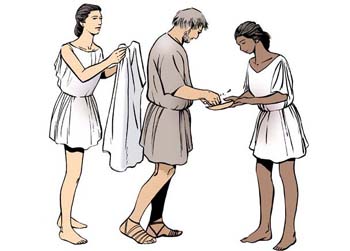 After the son's admission of his faults, « Father, I have sinned against heaven, and before thee, I am not now worthy to be called thy son. », the father tells his servants : « Bring forth quickly the first robe, and put it on him, and put a ring on his hand, and shoes on his feet. » At the time of Christ, only free and rich men wore shoes (or sandals). The poor and the slaves who never wore them went barefoot. By these words, « put shoes on his feet », the Father liberates us from the slavery of sin in which we put ourselves. And He goes further still. Again in Christ's time, only the masters wore rings on their fingers. Servants did not. The Father completely restores the initial state of life. He who is the absolute master of all things, He gives us the possibility to participate in His divine life. Without any merit on our part, He puts the ring of alliance back on our finger. In other words, He comes back into our soul. This grace that He gives us is called « sanctifying grace » because it makes us children of God, brother of Jesus Christ and living temple of the Holy Spirit. It sanctifies our soul, makes it « divine » (Saint Paul), not so that we become God but that we resemble Him by our intimate union with Him and the gift that He gives us of Himself. When we possess it, we are in a state of grace.
After the son's admission of his faults, « Father, I have sinned against heaven, and before thee, I am not now worthy to be called thy son. », the father tells his servants : « Bring forth quickly the first robe, and put it on him, and put a ring on his hand, and shoes on his feet. » At the time of Christ, only free and rich men wore shoes (or sandals). The poor and the slaves who never wore them went barefoot. By these words, « put shoes on his feet », the Father liberates us from the slavery of sin in which we put ourselves. And He goes further still. Again in Christ's time, only the masters wore rings on their fingers. Servants did not. The Father completely restores the initial state of life. He who is the absolute master of all things, He gives us the possibility to participate in His divine life. Without any merit on our part, He puts the ring of alliance back on our finger. In other words, He comes back into our soul. This grace that He gives us is called « sanctifying grace » because it makes us children of God, brother of Jesus Christ and living temple of the Holy Spirit. It sanctifies our soul, makes it « divine » (Saint Paul), not so that we become God but that we resemble Him by our intimate union with Him and the gift that He gives us of Himself. When we possess it, we are in a state of grace.
The sacrament of reconcilation
We will not go into the ritual of this sacrament here but what we call today the « sacrament of reconcilation » has had, and still has, different names. Its true meaning will allow us to reveal the different effects of this sacrament * The text which follows is an extract from the CCC, § 1423 et 1424..
It is called the sacrament of conversion because it makes sacramentally present Jesus' call to conversion (Mk 1 :15), the first step in returning to the Father (Lk 15 :18) from whom one has strayed by sin.
It is called the sacrament of Penance, since it consecrates the Christian sinner's personal and ecclesial steps of conversion, penance, and satisfaction.
It is called the sacrament of confession, since the disclosure or confession of sins to a priest * The priest doesn't forgive sins in his own name but « in the name of the Father, the Son and the Holy Spirit ». is an essential element of this sacrament. In a profound sense it is also a "confession" - acknowledgment and praise - of the holiness of God and of his mercy toward sinful man.
It is called the sacrament of forgiveness, since by the priest's sacramental absolution God grants the penitent "pardon and peace."
It is called the sacrament of Reconciliation, because it imparts to the sinner the love of God who reconciles: "Be reconciled to God" (2 Co 5 : 20). He who lives by God's merciful love is ready to respond to the Lord's call: "Go; first be reconciled to your brother"(Mt 5:24).
Article 12.
If your intention is forthright
We find this conditional, « if your intention is forthright », in the account of Genesis « Cain and Abel » (Gn 4). This text is going to help us deepen what we call purity of heart.
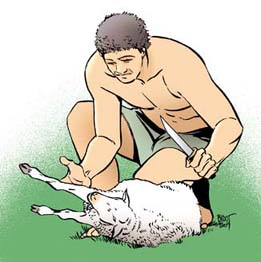 « And Adam knew Eve his wife ». From this first union was born a first son : Cain. She then gave birth to a second son : Abel. The two sons grow, and while Cain cultivates the earth, Abel becomes a shepherd of small livestock. One day, both present an offering to their Creator, in other words, they both sacrifice something dear to them to please God, a little like a man in love would offer a bouquet of flowers to a woman for whom his heart has started to beat very strongly. Cain burns his earth offerings and Abel offers the firstborns from his herd, including their fat. However the Lord « had respect to Abel, and to his offerings. But to Cain and his offerings he had no respect: and Cain was exceedingly angry, and his countenance fell. » Obviously the exclamations which can arise from the reading of this passage are the following : but why doesn't God accept Cain's offering ! Would that be a lack of justice on His part ! Cain is very upset, but frankly, he has every reason ! Since God accepts from one, why doesn't he accept from the other ! Moreover, if Yahweh had accepted Cain's offering, Cain wouldn't have killed his brother afterwards. In short, not to accept an offering is one of the things that just isn't done.
« And Adam knew Eve his wife ». From this first union was born a first son : Cain. She then gave birth to a second son : Abel. The two sons grow, and while Cain cultivates the earth, Abel becomes a shepherd of small livestock. One day, both present an offering to their Creator, in other words, they both sacrifice something dear to them to please God, a little like a man in love would offer a bouquet of flowers to a woman for whom his heart has started to beat very strongly. Cain burns his earth offerings and Abel offers the firstborns from his herd, including their fat. However the Lord « had respect to Abel, and to his offerings. But to Cain and his offerings he had no respect: and Cain was exceedingly angry, and his countenance fell. » Obviously the exclamations which can arise from the reading of this passage are the following : but why doesn't God accept Cain's offering ! Would that be a lack of justice on His part ! Cain is very upset, but frankly, he has every reason ! Since God accepts from one, why doesn't he accept from the other ! Moreover, if Yahweh had accepted Cain's offering, Cain wouldn't have killed his brother afterwards. In short, not to accept an offering is one of the things that just isn't done.
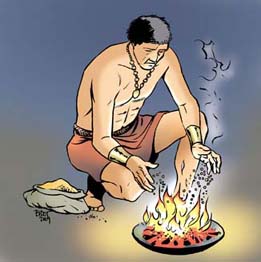 However the rest of the narrative enlightens us on the reason for divine refusal : « And the Lord said to him: « Why art thou angry? and why is thy countenance fallen? If thou do well, shalt thou not receive? but if ill, shall not sin forthwith be present at the door? but the lust thereof shall be under thee, and thou shalt have dominion over it. » » In God's eyes, the intention is the determining factor ; in other words, it is not so much the act that counts as the intention which motivates the act. Let us look again at the example of our man in love offering a bouquet of flowers to the charming lady. Let us imagine for a moment that she has, in fact, two admirers, each one offering within hours of each other a magnificent bouquet of flowers. Ladies (who were once single) reading these lines, you know the expression : « say it with flowers. » Nevertheless, and even though the lady's heart is undecided in its own feelings towards the two suitors, she accepts the bouquet of flowers from the one but not from the other . Indeed, in her wholly feminine intuition, she discerns that for one of the two, the bouquet of flowers masks only the desire to sleep with her while for the other, it is as an expression of true feeling coming from the heart. Should she have accepted the two bouquets for the sake of a very peculiar justice ? No, it goes without saying. Well, if God doesn't accept Cain's offering, it's for the same reason. Cain's offering isn't a sensitive expression of a true feeling whereas Abel's offering is filled with that purity of intention which renders the offering agreable to He who receives it. It is a real expression of his love for his Creator. Love, always love. Later, in the mouth of the prophet Hosea, the Lord tells us, « for faithful love is what pleases me, not sacrifice; knowledge of God, not burnt offerings. » (Hosea 6 : 6)
However the rest of the narrative enlightens us on the reason for divine refusal : « And the Lord said to him: « Why art thou angry? and why is thy countenance fallen? If thou do well, shalt thou not receive? but if ill, shall not sin forthwith be present at the door? but the lust thereof shall be under thee, and thou shalt have dominion over it. » » In God's eyes, the intention is the determining factor ; in other words, it is not so much the act that counts as the intention which motivates the act. Let us look again at the example of our man in love offering a bouquet of flowers to the charming lady. Let us imagine for a moment that she has, in fact, two admirers, each one offering within hours of each other a magnificent bouquet of flowers. Ladies (who were once single) reading these lines, you know the expression : « say it with flowers. » Nevertheless, and even though the lady's heart is undecided in its own feelings towards the two suitors, she accepts the bouquet of flowers from the one but not from the other . Indeed, in her wholly feminine intuition, she discerns that for one of the two, the bouquet of flowers masks only the desire to sleep with her while for the other, it is as an expression of true feeling coming from the heart. Should she have accepted the two bouquets for the sake of a very peculiar justice ? No, it goes without saying. Well, if God doesn't accept Cain's offering, it's for the same reason. Cain's offering isn't a sensitive expression of a true feeling whereas Abel's offering is filled with that purity of intention which renders the offering agreable to He who receives it. It is a real expression of his love for his Creator. Love, always love. Later, in the mouth of the prophet Hosea, the Lord tells us, « for faithful love is what pleases me, not sacrifice; knowledge of God, not burnt offerings. » (Hosea 6 : 6)
Everything comes from the heart
Purity proceeds from the heart. As the heart is, so are our thoughts, words, outlook, actions. It is from his heart that the just draws out good, and the more he draws it out, the more he finds it, for the good that we do gives birth to a new good. Wicked man draws out evil from his heart which is bad and he draws out bad from his heart exclusively through the faults which he accumulates, « For from the heart come evil intentions: murder, adultery, fornication, theft, perjury, slander. These are the things that make a person unclean. » (Mt 15 19-20) In any case, it is the excess of the heart which overflows from the lips and finds expression in actions.
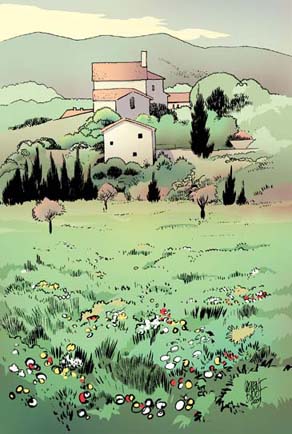
In our pilgrimage towards God, the value of our purity of heart is decisive. Satan knows it so well that he always begins by tempting us through impurity. He knows that a fault of sensuality dismantles the soul and makes it easy prey for other faults. God, even so, is longsuffering. Man is free. But God gives us strength through his grace. He delivers us from Satan's domination. It is for each of us to choose either to return to the infernal yoke or to put angels' wings on his soul. Everything depends on oneself to take Jesus Christ as brother so that he is the guide towards God the Father.
Let us make a humble and pure heart, loving, trusting, sincere. Let us love God with the love of a virgin for her fiancé. Truly, every soul is a virgin, married to the Eternal love, to God our Lord. Earth is the time of our engagement in which all the hours, all the contingencies of life are like the handmaids who prepare the bridal trousseau. The hour of death is the time of the fulfillment of our wedding. The soul can then take away its veil and jump into the arms of its God.
